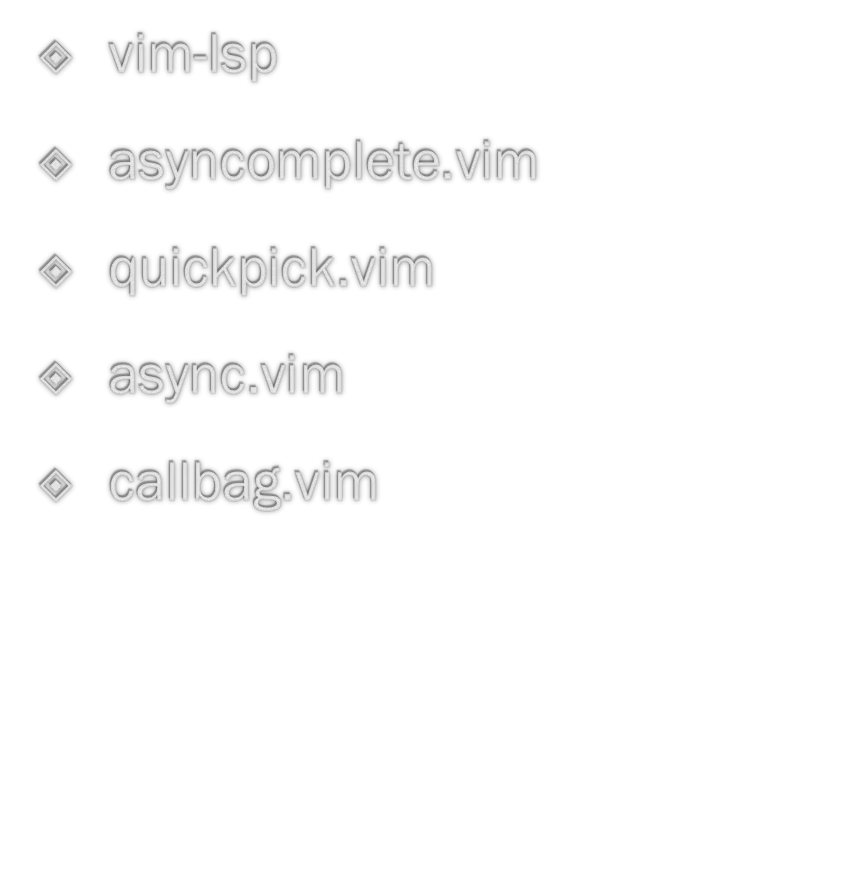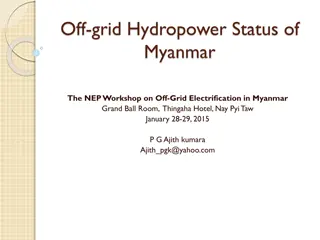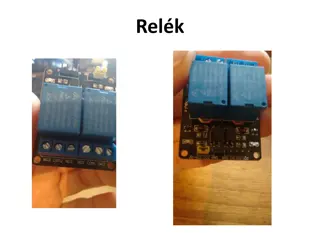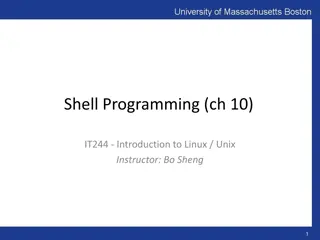Introduction to VimScript Development: A Dive into OSS VIM Projects
Explore VimScript development through open-source VIM projects like vim-lsp, typescript-language-server, and more in this talk. Learn about version
Download Presentation

Please find below an Image/Link to download the presentation.
The content on the website is provided AS IS for your information and personal use only. It may not be sold, licensed, or shared on other websites without obtaining consent from the author. Download presentation by click this link. If you encounter any issues during the download, it is possible that the publisher has removed the file from their server.
E N D
Presentation Transcript
Learning VimScript @PrabirShrestha Sep 2020
OSS VIM Projects vim-lsp typescript-language-server asyncomplete.vim quickpick.vim async.vim callbag.vim
Vimscript v9 This talk will not cover vimscript version 9. Vimscript/Viml in this presentation will refer to version <= 8.
Hello World Vimscript :echo "Hello world" :let message = "Hello world" :echo message
.vimrc echo "Hello" echo "World" echom "Hello" echom "World"
Interpreted Imperative What is Viml/Vimscript <= 8? Dynamic Partial Runtime Type Checks Functional Optional Simple Object Oriented
:help :help is your best friend
:help variables string Job number Channel float Blob null dictionary list funcref
:help variables let string = "String" let number = 1 let float = 1.0 let list = [1, 2, "hello", "world" ] let dictionary = { "message": "hello world" }
Multiline statements " list with default values let list = [ \ 1, 2, \ "hello", \ "world" ] " dictionary default values let dictionary = { \ "message": "hello world" \ }
Comments in multiline statements??? let list = [ \ 1, " first \ 2, " second \ "hello", " third \ "world" " forth \ ]
Special Variables let t = v:true let f = v:false let n = v:null
What is the scope of the variable??? let string = "String" let number = 1 let float = 1.0 let list = [1, 2, "hello", "world" ] let dictionary = { "message": "hello world" }
Variable Scoping let g:global_var = "global variable accessible across all script" let s:script_var = "script level variable accessible across the entire script/file" let l:local_var = "local variable accessible only in the scope" let b:buffer_var = "buffer scope" let w:window_var = "window scope" let t:tab_var = "tab scope"
:h function let s:greeting = 'Hello' function g:Greet(name) echom s:greeting . " " . a:name endfunction call g:Greet("world")
function: error handling function g:Greet(message) echom s:greeting echom a:name endfunction call g:Greet("world")
function: abort function g:Greet(message) abort echom s:greeting echom a:name endfunction call g:Greet("world")
try..catch try throw 'this is an error message' catch echom v:exception echom v:throwpoint endtry
:h E128 try function g:hello() abort endfunction call g:hello() catch /E128/ echom 'caught E128:' echom v:exception echom v:throwpoint catch /.*/ echom 'catch finally echom 'finally endtry
variable function arguments function! s:log(message, ...) abort echom a:message if a:0 > 0 echom a:1 endif endfunction call s:log("invalid error") call s:log("invalid buffer", 1)
if | | endif function! s:log(message, ...) abort echom a:message if a:0 > 2 | return | endif if a:0 > 0 | echom a:1 | endif if a:0 > 1 | echom a:2 | endif endfunction call s:log("invalid error") call s:log("invalid buffer", 1)
a:000 function! s:log(message, ...) abort echom a:message for l:item in a:000 echom l:item endfor endfunction call s:log("invalid error") call s:log("invalid buffer", 1) call s:log("invalid buffer", 1, 2, "three")
String Concatenation let msg = 'Hello' . ' ' . 'world'
noignorecase set noignorecase function! s:log(word) abort if a:word == 'one echom '1 elseif a:word == 'two echom '2 else echom 'unknown endif endfunction call s:log('one ) call s:log('One')
Single vs Double quotes echo 'hello\nworld' " prints " hello\nworld echo "hello\nworld" " prints: " hello " world
string slice let message = "helloworld" echom message[0:4] " hello echom message[5:] " world echom message[-5:] " world echom message[:-6] " hello
:h list :h dict Learn the apis: add remove has_key copy keys items()
Type Checking echom type('hello') == v:t_string echom type('world') == type('')
Callback function! s:greet(name) abort call timer_start(1000, function('s:timer_callback')) endfunction function! s:timer_callback(timer) abort echom 'Hello name???' endfunction
Callback function! s:greet(name) abort call timer_start(1000, function('s:timer_callback', [a:name])) endfunction function! s:timer_callback(name, timer) abort echom 'Hello ' . a:name endfunction
Lambda function! s:greet(name) abort call timer_start(1000, {t->s:timer_callback(name)}) endfunction function! s:timer_callback(name) abort echom 'Hello ' . a:name endfunction
:h autocmd autocmd CursorMoved,CursorMovedI * call s:cursor_moved() function! s:cursor_moved() abort echom "cursor moved" endfunction
:h autocmd-groups augroup mygroup autocmd CursorMoved,CursorMovedI * call s:cursor_moved() augroup END function! s:cursor_moved() abort echom "cursor moved" endfunction
:h autocmd-groups augroup mygroup autocmd! autocmd CursorMoved,CursorMovedI * call s:cursor_moved() augroup END function! s:cursor_moved() abort echom "cursor moved" endfunction
:h write-plugin Writing your first plugin
plugin/helloworld.vim if exists('g:loaded_helloworld') | return | end if let g:loaded_helloworld = 1
Adding first command if exists('g:loaded_helloworld') | finish | endif let g:loaded_helloworld = 1 " user can call using :Greet command command Greet call s:greet() function! s:greet() abort echom 'hello world endfunction
autoload " auoload/helloworld/greetings.vim function helloworld#greetings#good_morning() abort echom 'Good morning endfunction " plugin/helloworld.vim command Greet call helloworld#greetings#good_morning()
autoload greetings.vim function helloworld#greetings#good_morning() abort echom 'Good morning endfunction function! helloworld#greetings#good_afternoon() abort call s:good_afternoon() endfunction function! s:good_afternoon() echom 'Good afternoon endfunction
Organizing files function! helloworld#greetings#greet() abort let l:hour = helloworld#greetings#utils#get_hour() if l:hour < 10 call helloworld#greetings#good_morning() elseif l:hour < 17 call helloworld#greetings#good_afternoon() else echom 'Good evening endif endfunction
Mappings nnoremap <plug>(helloworld-greet) :<c-u>call helloworld#greetings#greet()<cr> if !hasmapto('<Plug>(helloworld-greet)', 'n') && (mapcheck("<F9>", "n") == "") nmap <silent> <F9> <plug>(helloworld-greet) endif
































